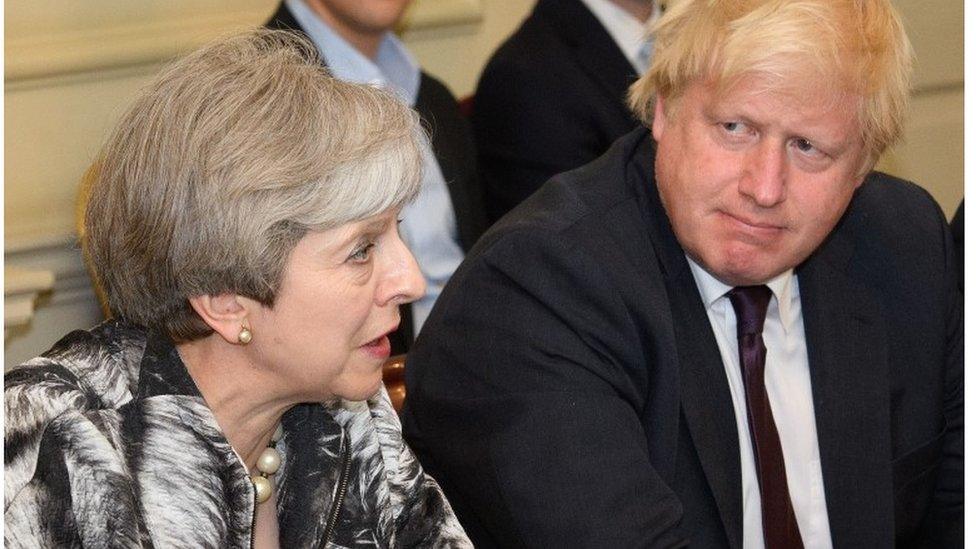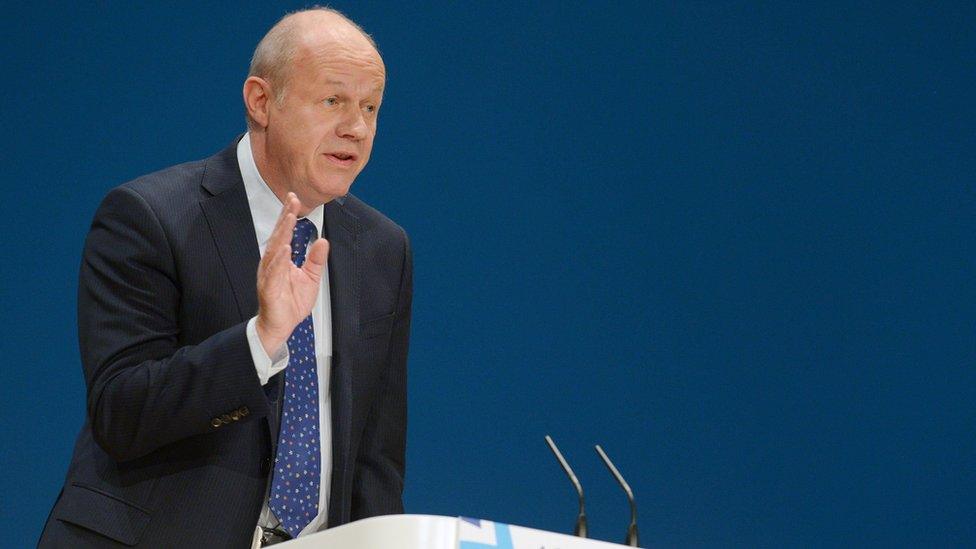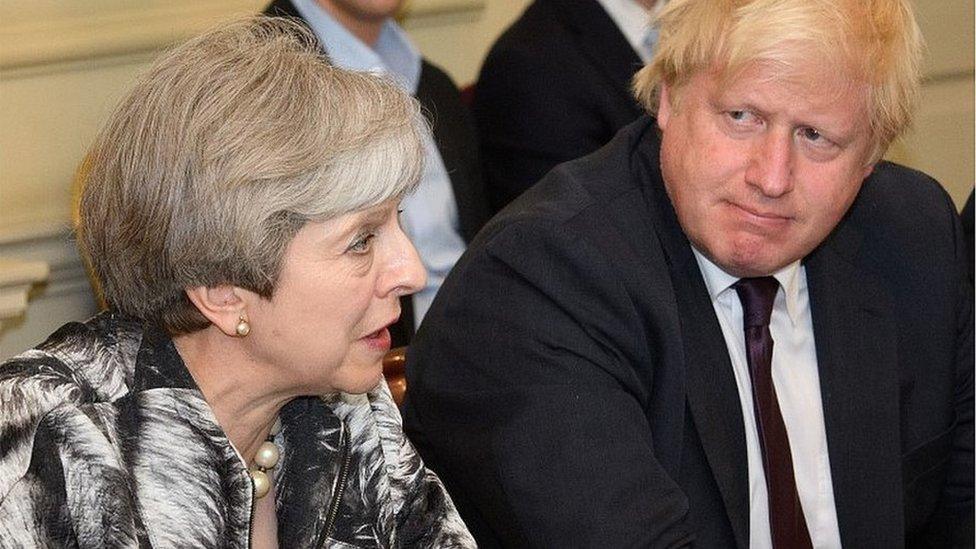Brexit: Boris Johnson 'back-seat driving' over Brexit, says Rudd
- Published
Amber Rudd told the BBC's Andrew Marr "you could call it back-seat driving (by Boris Johnson)"
Boris Johnson has been accused of being a Brexit "back-seat driver" by the home secretary.
Amber Rudd said it was fine for Mr Johnson to show his enthusiasm but he was not "driving the car" after he set out his vision for the UK post-Brexit in an article in the Daily Telegraph. , external
She said ministers must be united in their approach and help the prime minister manage the Brexit process.
The BBC understands Mr Johnson will not be sacked despite anger among some MPs.
Lib Dem leader Vince Cable urged the prime minister to "fire this guy on Monday morning", warning that if she did not act her authority would be "reduced to zero".
Meanwhile the chairman of the UK Statistics Authority has written to Mr Johnson, questioning his decision in the 4,000 word article in Saturday's Telegraph to refer again to a disputed figure used by Leave campaigners during the referendum about the UK's EU budget contributions.
"I am surprised and disappointed that you have chosen to repeat the figure of £350m per week in connection with the amount that might be available for extra public spending when we leave the European Union," Sir David Norgrove said.
"It is a clear misuse of official statistics," he added.
'Irrepressible enthusiast'
Ms Rudd said she had been too busy dealing with the terror attack in London to read the foreign secretary's article.
But asked about Mr Johnson's intervention, she said: "You could call it back-seat driving, absolutely."
"I don't want him managing the Brexit process, what we have got is Theresa May managing the process, driving the car. I am going to make sure, as far as I and the rest of the cabinet is concerned, we help her do that."
Asked whether she shared the concerns of those - including Scottish Tory leader Ruth Davidson - who have criticised the timing of the intervention. she said they had a point.
"I know what an irrepressible enthusiast (Johnson) is about Brexit, and what he's done is set it out there, I think it's absolutely fine, I would expect nothing less from Boris," she said.

Analysis: Reaction 'rather more salty'

Mr Johnson has been accused by some of undermining the prime minister
By BBC political correspondent Chris Mason
When politicians criticise colleagues on their own side, in public, they often indulge in a little understatement.
When you hear, for instance, a reference to a "robust exchange of views", you can assume the encounter actually bordered on the violent.
So, when Mrs May's de facto deputy, Damian Green, told BBC Radio 5 live that the timing of Mr Johnson's intervention "could have been better for all sorts of reasons", you can imagine that the reaction privately, from some, has been rather more salty.
And it has.
Two of the government's most senior figures, in the space of an hour, publicly admonishing a cabinet colleague tells you all you need to know about how unwelcome Mr Johnson's 4,000 word treatise was in Downing Street.

When asked if the article was a leadership challenge, Rudd said "no, I don't think it is". "I think that he, like I, supports the prime minister at this difficult time as we try to conclude the negotiations with the EU."
After his article's publication Mr Johnson later tweeted he was "all behind Theresa for a glorious Brexit".
In his article, Mr Johnson had said the UK should not be giving the EU any money to gain access to the single market after Brexit and said he would like to see a lot of the money recovered from Brussels going to the NHS, repeating the disputed referendum claim that exit could provide an extra £350m for the health service.

Damian Green told BBC Radio 5live Mr Johnson's article "could have been better"
The intervention comes just days before the prime minister makes a major speech on Brexit in Florence, amid speculation she is prepared to announce some kind of deal on transitional trade payments.
Damian Green, a close ally of the prime minister, told Radio 5live's Pienaar's Politics, that the timing of Mr Johnson's article "could have been better for all sorts of reasons not least the terrible terrorist incident we've had".
But he insisted the cabinet was united around the prime minister. "There is a huge challenge facing this country that we have got to get these negotiations right," he said. "That whatever we said during the referendum campaign, whichever side we were on, the duty of everyone in government is to make sure we get the best deal for Britain."
Security treaty
Ms Rudd has also announced the UK wants to agree a new treaty with the EU after it leaves in March 2019 to ensure existing security co-operation is fully maintained.
Details will be published on Monday on how the UK will aim to continue to share information and evidence on wanted criminals with its EU partners after leaving and ensure suspects can still be extradited quickly.
She said a new treaty would "lock in" existing cross-border crime-fighting and intelligence-sharing arrangements and enable the UK to remain a member of Europol outside of the EU.
"I want the French man in London to be safe and the English man in Berlin. They (the EU) want the same outcomes."
She conceded the UK's security would be weakened if it was unable to agree an over-arching Brexit deal but she was "absolutely confident" this would not happen.
"The PM has expressed the bald truth which is that we need to have this agreement - they do and we do - and we will get it."
- Published16 September 2017
